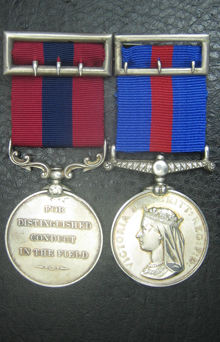
DISTINGUISHED CONDUCT MEDAL V.R. ‘BENJN THOMAS 65TH REGT’; NEW ZEALAND MEDAL 1861-1866 ‘3214 BENJN THOMAS 65TH REGT’. D.C.M. OFFICIALLY IMPRESSED, SECOND RENAMED IN A CONTEMPORARY STYLE.
Benjamin Thomas was born in Leominster, England in March 1836. He enlisted in the 65th Regiment of Foot at Parkhurst on 31 October 1854, stating his occupation as Labourer and age at 18 years, 7 months. He embarked for New Zealand from Portsmouth on the 'Euphrates' on 26 December 1854 and arrived in Auckland on 26 April 1855. Private Thomas' detachment was immediately posted to disturbances in the Taranaki region. They served at Waireka in March 1860 and returned to Auckland in 1863. Later that year a detachment of the 65th Regiment (including Private Thomas) sent to man Alexandra Redoubt, overlooking the Waikato River near Tuakau, South of Auckland. From here they took part in a number of engagements and small skirmishes in the surrounding bush against hostile Maori who had been attacking supply lines and local settlers.
On 7 September 1863, in response to a request for assistance, a party of 50 soldiers from the 65th Regiment of Foot led by Captains Swift and Butler set forth from Alexandra Redoubt to Camerontown, 8 miles distant. After some time the troops encountered a raiding party of 300 hostile Maori who had been attacking the Commissariat depot at Camerontown. The Maori were positioned in large trees and dense bush on either side of the path to be used by the soldiers. A horrific volley of fire ensued and both officers in the detachment fell seriously wounded. Colour Sergeant McKenna assumed command of the party and charged the Maori who had temporarily retreated into the bush. Four Privates (including Private Thomas) under the command of Lance Corporal Ryan remained with the two wounded officers whilst McKenna and the balance of the Imperials pursued the Maoris through the bush. As night set in Captain Swift died and Corporal Ryan and two Privates (Cole and Talbot) returned to Alexandra Redoubt. The Maoris had doubled back around the party led by McKenna and were now scouring the bush for the two officers and those that had remained with them, necessitating the men to constantly find new cover.
Privates Thomas and Bulford remained with Lieutenant Butler and, as Lieutenant Butler complained bitterly of the cold, Private Thomas removed his wool short and greatcoat and covered Lieutenant Butler with them. Eventually Thomas and Bulford decided to carry Lieutenant Butler to Alexandra Redoubt. They made their way through the dense bush and arrived near the Redoubt at sunrise the next morning. Lieutenant Butler subsequently recovered from his wounds.
https://vcgca.org/our-people/profile/1171/Edward-McKENNA
As Thomas was discharged in New Zealand, his Maori Wars medal would have been issued there but it is not clear whether his medal would have been named to the 65th, or the Forest Rangers, both of which would have been locally engraved, or to the Waikato Militia, which would be Impressed. Thomas’s medal is renamed in a contemporary style, similar to officially renamed and issued in the 1870’s. During this period medals issued in New Zealand were officially engraved using renamed medals and a large number of medals were issued this way, so it is possible Thomas either applied later for a medal or for a replacement. However the archives in New Zealand holds applications for these medals and so far, no application has been found for Thomas. As such, though the medals have been known in major collections for a long time, they are priced as the D.C.M. and a contemporary but unofficially renamed Maori Wars medal would be.
Condition VF, claw tightened on D.C.M. Sold with copy research, including ‘Private Benjamin Thomas D.C.M., a long forgotten hero’ by Aubrey Bairstow in Volunteers, 1997; v.23. Ex Corbett collection and Mackrell Collections, Auckland. Nobles auctions 2005.
Just 22 DCMs were awarded for the New Zealand Wars, of which 4 are privately held and only 7 are known.